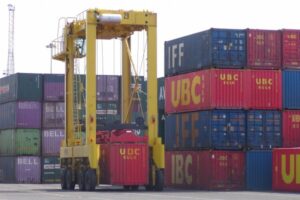UK Ports Industry
UK Ports Industry
The UK port industry is the second largest in Europe, handling almost 500 million tonnes of freight each year, as well as over 60 million international and domestic passenger journeys.
The UK ports sector is also estimated to directly employ around 101,000 people.
Types of Port
Just as the markets they serve vary, so too do ports themselves. The ports sector in the UK has changed substantially over the last twenty years. A process of deregulation has created a ports sector unique within the EU.
Ports in the UK fall into one of three ownership categories:
- Private
- Municipal
- Trust
All three models are open to market forces, and are run independently as stand-alone, self-financing enterprises, free from systematic Government support or subsidy.
For more information about trust ports please refer to our briefing paper.
Ports and Government
The Government’s support for an independent industry was firmly established in Modern Ports, a full-scale review of national port policy in 2000
The National Policy Statement for Ports, which also included trade forecasts, was published in 2012, and confirms this policy as a proven approach to sustaining a successful ports industry.
Ports & Cargo

Over 95% of imports and exports by volume, and 75% by value still pass through the country’s ports.
Cargo: Much of the cargo entering and leaving Britain is in the form of raw materials – oil, chemicals, petroleum, ores, grains and feedstuffs – the commodities needed to fuel the economy.
Finished Goods: Additionally there is ‘Finished goods’ cargo which includes vehicles, fresh foods, steel, timber, building materials, machinery and consumer goods – to name but a few.
Solving Issues: Ports can also make a contribution to solving or reducing national transport problems, congestion and environmental damage caused by land modes by using shipping instead.
To promote the maritime sector, the BPA supports the work of Freight by Water, an organisation dedicated to the promotion of short sea and coastal shipping throughout the EU.
Other Port Services
In addition to its traditional cargo and passenger handling roles, the ports industry offers a range of other services, for example supporting the offshore energy industry and maintaining ferry links to island communities.
Some provide auction markets for the fishing industry whereas others are specialists in the fast growing leisure and recreation fields.
A particular growth area in recent years has been the cruise liner trade. There are many ports now providing excellent facilities around the country as the tourist market grows.
Ports and Communities
Ports are often at the heart of their communities. Whatever their size, they are major providers of employment within their areas, and through leisure activities such as yachting, many contribute to local economies in other ways.
Trust and Municipal Ports governance structures are particularly designed to reflect local markets and the needs of local communities.

